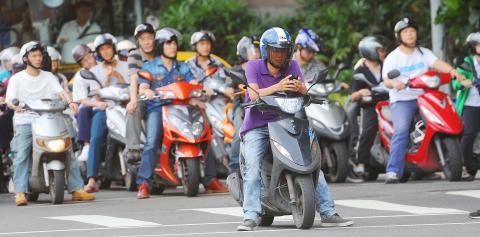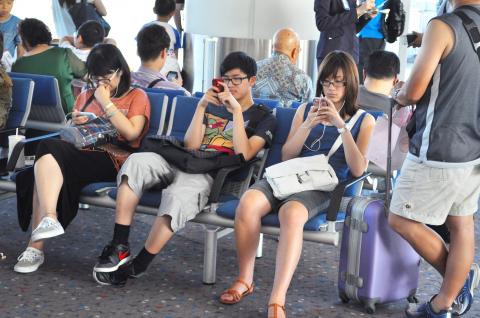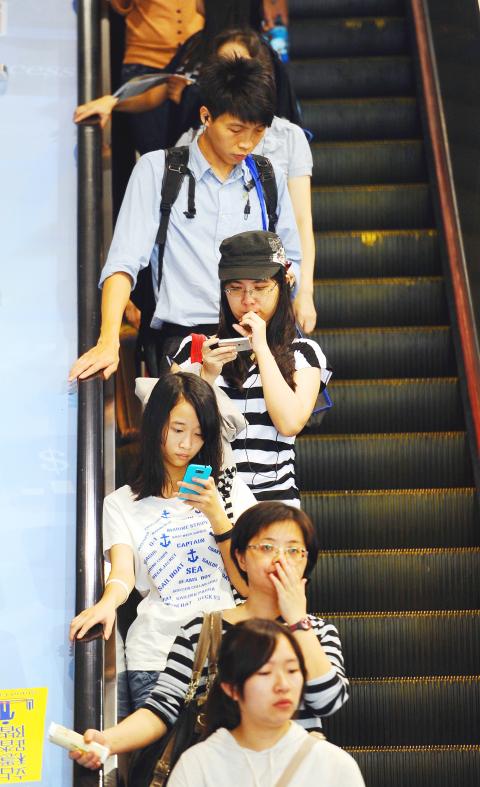Do you constantly check your e-mail accounts or refresh your Facebook page using a smartphone? If the answer is yes, you are undoubtedly one of a fast-growing demographic playfully known as the “heads-down tribe (低頭族),” which comes from a Chinese term that doctors and researchers use to describe smartphone addicts who are susceptible to traffic accidents, physical illness or psychological disconnection.
An annual survey conducted by the Taiwan Network Information Center, which investigates the use of broadband Internet services among people above the age of 12, showed a rapid increase in the number of wireless Internet and mobile communications users over the past year.
The survey showed that the number of people accessing the Internet via laptops, tablets or smartphones in the past six months in Taiwan had surged to a record 5.35 million people, twice the figure reported in the same period last year.

Photo: Liu Hsin-de, Taipei Times
“While the 5.35 million people [using mobile broadband services] may all exhibit some certain level of ‘neck-bending,’ the term ‘heads-down tribe’ refers to heavy [smartphone] users. The number of people who fit into this category would be marginally lower,” said Fu Jen Catholic University statistics professor Liang Te-hsin (梁德馨), who led the survey.
However, because of the swift progress of mobile Internet technology and the growing versatility of applications for smartphones, the number of smartphone addicts is expected to grow, Liang said.
With the “addiction” reaching epidemic proportions worldwide, several countries have enacted regulations and penalties to stop drivers from using mobile devices to decrease the potential threat to road safety.

Photo: Liu Li-jen, Taipei Times
In Japan, cyclists have been banned from using mobile phones in most prefectures. Tokyo-based Taiwanese writer Liu Li-erh (劉黎兒) said a female high-school student from Kanagawa Prefecture was brought to a family court in May to face a ¥50,000 (US$630) fine for cycling 600m while using her cellphone, despite having received four warning tickets.
The US city of Fort Lee, New Jersey, has also begun cracking down on smartphone-addicted pedestrians, passing an ordinance in March that stipulated an US$85 fine for people who walk and use their smartphones at the same time.
Fort Lee police chief Thomas Ripoli said there had been “three fatalities and 23 people injured in a three-month period due to their being distracted by technology while traveling.”

Photo: Chang Chia-ming, Taipei Times
In Taiwan, the Ministry of Transportation and Communications and the legislature in May amended the Act Governing the Punishment of Violation of Road Traffic Regulations (道路交通管理處罰條例) to clamp down on absent-minded drivers. Since September, motorists and motorcyclists caught using any portable technology device without a hands-free kit while operating their vehicles may be fined of NT$3,000 and NT$1,000 respectively.
In addition to posing dangers to other road users, the “heads-down tribe” is also prone to a series of physical discomforts, including dry eye syndrome, swollen eyes and headaches, as a result of excessive use of their eyes and maintaining an unnatural posture while viewing a smartphone screen for extended periods of time.
Tri-Service General Hospital’s Department of Ophthalmology director Lu Da-wen (呂大文) said in the past, the majority of people suffering from so-called computer vision syndrome — an eye condition that many computer users complain of after staring at unprotected screens for long periods of time — were only experiencing dry eyes.
“Now with iPads and iPhones gaining popularity, people in the ‘heads-down tribe’ are also experiencing pressure and swelling in their eyes because they are holding their necks in an unnatural posture for long periods of time, which stretches their eye muscles and causes headaches,” Lu said.
Cheng Hsin Hospital physician Chen Chien-cheng (陳建成) said the number of young outpatients coming in with shoulder stiffness or neck pain is increasing, with many saying their physical discomforts started after they began using smartphones or tablets.
Chen said smartphone addicts should not remain in a fixed posture for long periods of time, adding that they should take breaks from their devices every half hour and stretch, while resting their eyes periodically, Chen said.
Doctors and parents are also concerned about the effect that the overuse of smartphones and tablets has on the mental state of the “heads-down tribe.”
“Smartphone addiction is the same as Internet addiction, but the former is a new condition that cannot yet be medically measured by the standard rating scale,” said Chang Hsueh-ling, a psychiatrist at Chang Gung Memorial Hospital’s Department of Child and Adolescent Psychiatry.
Chang said the number of smartphone addicts seeking medical treatment was gradually increasing, with most brought in by concerned parents, who expressed frustration over their inability to communicate with their “addicted” children.
Such an unhealthy obsession could also have an adverse impact on children’s interpersonal relationships, Chang said, while urging family members to pay extra attention to smartphone-addicted youngsters.
Additional reporting by Wei Yi-chia

Taiwan is to commence mass production of the Tien Kung (天弓, “Sky Bow”) III, IV and V missiles by the second quarter of this year if the legislature approves the government’s NT$1.25 trillion (US$39.78 billion) special defense budget, an official said yesterday. Commenting on condition of anonymity, a defense official with knowledge of the matter said that the advanced systems are expected to provide crucial capabilities against ballistic and cruise missiles for the proposed “T-Dome,” an advanced, multi-layered air defense network. The Tien Kung III is an air defense missile with a maximum interception altitude of 35km. The Tien Kung IV and V

The disruption of 941 flights in and out of Taiwan due to China’s large-scale military exercises was no accident, but rather the result of a “quasi-blockade” used to simulate creating the air and sea routes needed for an amphibious landing, a military expert said. The disruptions occurred on Tuesday and lasted about 10 hours as China conducted live-fire drills in the Taiwan Strait. The Civil Aviation Administration (CAA) said the exercises affected 857 international flights and 84 domestic flights, affecting more than 100,000 travelers. Su Tzu-yun (蘇紫雲), a research fellow at the government-sponsored Institute for National Defense and Security Research, said the air

A strong continental cold air mass is to bring pollutants to Taiwan from tomorrow, the Ministry of Environment said today, as it issued an “orange” air quality alert for most of the country. All of Taiwan except for Hualien and Taitung counties is to be under an “orange” air quality alert tomorrow, indicating air quality that is unhealthy for sensitive groups. In China, areas from Shandong to Shanghai have been enveloped in haze since Saturday, the ministry said in a news release. Yesterday, hourly concentrations of PM2.5 in these areas ranged from 65 to 160 micrograms per cubic meter (mg/m³), and pollutants were

Taiwan’s armed forces have established response protocols for a wide range of sudden contingencies, including the “Wan Chun Plan” to protect the head of state, the Ministry of Defense (MND) said today. After US President Donald Trump on Saturday launched a series of airstrikes in Venezuela and kidnapped Venezuelan President Nicolas Maduro, concerns have been raised as to whether China would launch a similar “decapitation strike” on Taiwan. The armed forces regularly coordinate with relevant agencies and practice drills to ensure preparedness for a wide range of scenarios, Vice Minister of National Defense Hsu Szu-chien (徐斯儉) told reporters before a